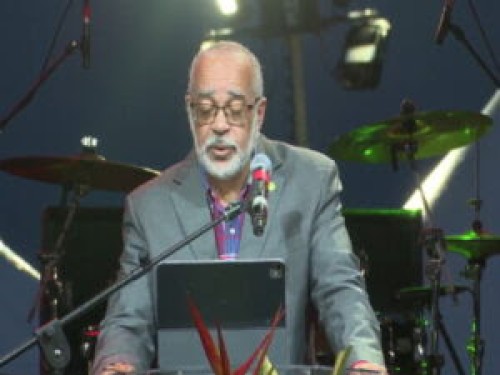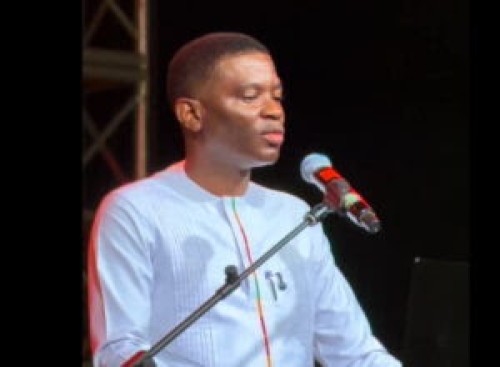OECS Stands With Grenada As It Navigates 'Imponderable' Currents
ST. GEORGE’S, Grenada – The Director General of the Organisation of Eastern Caribbean States (OECS), Dr. Didacus Jules, says the St Lucia based sub-regional grouping stands in full solidarity with Grenada and its people as the member state “navigates imponderable currents."
 Dr. Didacus Jules addressing the National Heroes Day ceremony in Grenada on Monday night (CMC Photo)”“We recognize the enormous pressures brought to bear on small states that strive to chart their own course in a turbulent world. And we affirm the right of every Caribbean nation to determine its destiny, free from coercion, free from fear, and faithful to its own conscience,” Jules said, while delivering the keynote address at the official National Heroes Day celebration which was held on Monday, 24 hours later due to the inclement weather.
Dr. Didacus Jules addressing the National Heroes Day ceremony in Grenada on Monday night (CMC Photo)”“We recognize the enormous pressures brought to bear on small states that strive to chart their own course in a turbulent world. And we affirm the right of every Caribbean nation to determine its destiny, free from coercion, free from fear, and faithful to its own conscience,” Jules said, while delivering the keynote address at the official National Heroes Day celebration which was held on Monday, 24 hours later due to the inclement weather.
Grenada is currently reviewing a request from the United States to temporarily install radar at the Maurice Bishop International Airport (MBIA) and the deployment of US military assets on or near Grenada.
A group comprising lawyers, educators, trade unionists and religious leaders calling itself the Coalition for a Zone of Peace has called on the government to say no to the request with former Senate president Chester Humphrey saying he is prepared to lead a peaceful protest and that the US request is a precursor to a possible invasion of Venezuela.
The Donald Trump administration has been building up a military presence off the coast of the South American country allegedly as part of its fight against the illegal shipment of drugs to the United States. Washington has confirmed that it has bombed several vessels, killing all but two people, in recent times as it puts its policy into action.
The highlight of the National Heroes Day celebration was a ceremony to turn the sod for establishing a Hero’s Park at the site of the former Riviera Hotel which is located alongside the Camerhogne Park in Grand Anse within close proximity to the Grand Anse beach.
“And so, today, as Grenada honours her heroes and reclaims her legacy, she does so against a backdrop of mounting geopolitical pressure. Once again, the powerful seek to use the small as pawns in their great game of global dominance,” Jules told the ceremony. Prime Minister Dickon Mitchell (CMC Photo)
Prime Minister Dickon Mitchell (CMC Photo)
Reiterating that the Caribbean has long declared itself a Zone of Peace or a region that chooses dialogue over domination, cooperation over confrontation, the OECS Director General drew attention to a recent statement made by th former Jamaica prime minister PJ Patterson who described recent US drone attacks on vessels in the Caribbean waters as “fundamentally dangerous” and a retreat from the longstanding declaration of the Caribbean as a Zone of Peace.
“This is not naivety; it is wisdom born of hard experience. We have seen how great powers use small lands for proxy wars, and how the lives of ordinary people are left shattered in their wake,” Jules said while giving his own opinion on the statement of Patterson.
“At times like these, it becomes even more vital that we do not allow our internal differences – political, social, or ideological – to fracture the unity that our ancestors forged through struggle,” he added.
Jules told the ceremony that the heroes whom Grenada are honoring did not fight for one faction or another and that they fought for the soul of Grenada, for the right of every Grenadian to stand tall in dignity.
“We must ensure that the scars of the past do not become the wounds of the present. Our task is to transform pain into purpose, memory into motivation, history into hope,” he said.
Though 2025 has been three years since declaring October 19 as National Heroes Day, the government is yet to name any person as a national hero.
However, the celebration has been centered on the life and work of the country’s first left wing leader, Maurice Bishop, who led his New Jewel Movement (NJM) in overthrowing the government of then prime minister Sir Eric Gairy, in the first coup in the English-speaking Caribbean on March 13, 1979.
But the People’s Revolutionary Government’s (PRG) rule ended in 1983 following a palace coup in which Bishop and several members of the administration were executed by a faction of his own government, leading to the a subsequent United States military invasion of the island.
In his address to the ceremony, Prime Minister Dickon Mitchell said as the country looks towards the future “let us do so, remembering that it is strength that is needed to heal.
“That it is strength that is needed to forgive and it is strength that is needed to reconclie and it is that reconciliation that will give us the strength and reason to move forward together.”
He said on this occasion, Grenada must not only reflect on the history that led to the National Heroes Day, “but we should acknowledge how far we have come.
“We should acknowledge and take pride that as a people we have come from a tradition of overcoming…our history has taught us that in spite of adversity we have an instinct to survive and bounce back bigger and better,” he added.
“So as our democracy matures we will continue to learn lessons from our past and we confront the reality of the present, we will continue to emphasis cooperation, dialogue, partnership, reconciliation and above all, the pursuit of peace must guide our relations with ourselves and the rest of the world.”
Section 16 of Grenada’s 2007 National Honours and Awards Act provides for establishing a Commission to be known as the Prestige Order of National Hero Commission.
The functions of the Commission are to make such investigations as it thinks fit to determine persons living or dead, upon whom may be conferred the Prestige Order of National Hero; and issue a report to the Prime Minister the result of those investigations.
The legislation says that the national hero title can be awarded to any person who was born in Grenada or who at the time of his or her death was a citizen of Grenada and gave outstanding service to Grenada.


